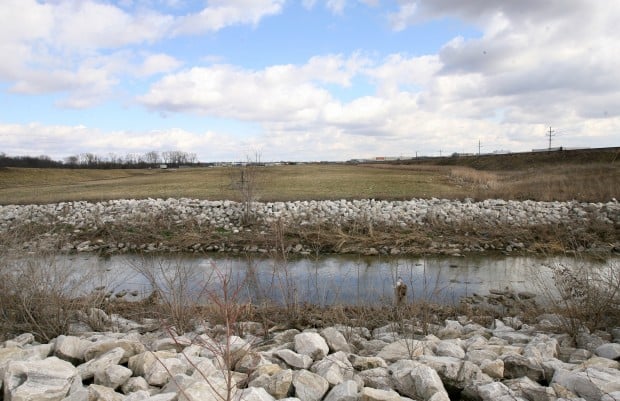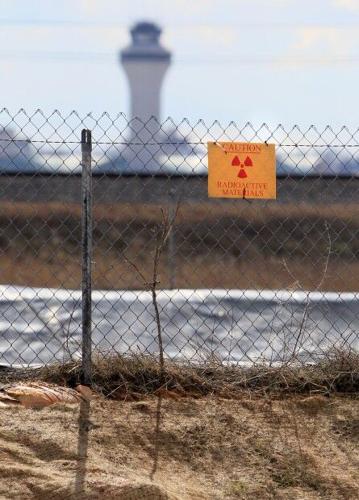A federal judge has dismissed all but one claim in lawsuits filed against the chemical company Mallinckrodt by 29 people who believe their cancers were caused by the radioactive contamination of Coldwater Creek.
In the ruling, U.S. District Court judge Audrey Fleissig granted on Wednesday the requests of attorneys for Mallinckrodt and other defendants to dismiss seven claims of negligence, emotional distress and liability under Missouri laws.
The eighth claim filed under a federal law involving injuries caused by exposure to nuclear materials was not dismissed. But Fleissig said lawyers for the residents have until May 10 to show that the injuries occurred no more than five years before the suit was filed, to meet MissouriŌĆÖs statute of limitation rules.
Most of the residents believe they were sickened from growing up in housing developments built around the creek in north ėŻ╠ę╩ėŲĄ County in the 1960s and 1970s.
People are also reading…
A ėŻ╠ę╩ėŲĄ attorney representing defendants DJR Holdings and the Jarboe company, current owners of contaminated land near Lambert Airport and Coldwater Creek, said he sympathized with the residentsŌĆÖ health problems but was pleased by the judgeŌĆÖs decision.
ŌĆ£My clients donŌĆÖt feel like they have really done anything to cause any harm to the plaintiffs,ŌĆØ said Stephen Jeffery. ŌĆ£TheyŌĆÖve never had anything to do with the contamination and participated with the federal government in trying to get it cleaned up.ŌĆØ
Attorneys for the North County residents, led by the TorHoerman law firm of Edwardsville, did not respond to requests for comment.
The decision is the latest setback for current and former residents who suspect there is a cluster of cancers that could be linked to Coldwater Creek. Last week, a Missouri health department report found no higher risk of cancers linked to radiation for people living in six ZIP codes adjacent to the creek, which runs from St. Ann near the airport to the Missouri River through Florissant, Black Jack and Spanish Lake.
Former residents dismissed the report as invalid because it didnŌĆÖt account for people who moved out of the area after growing up near the creek when it tested positive for high levels of uranium, radium and thorium.
Coldwater Creek was contaminated by nuclear waste from the production of atomic bomb materials by the Mallinckrodt company in downtown ėŻ╠ę╩ėŲĄ. After World War II, radioactive byproducts were dumped at an open storage site by the airport and buried near Coldwater Creek, which borders the waste site to the west. By the 1990s, soil and water samples from the creek showed unsafe radiation levels. The Army Corps of Engineers has nearly completed its cleanup of the airport waste sites and the creek.
A group of 13 people from North County filed a lawsuit in U.S. District Court in February 2012 alleging negligence that led to their cancers and other illnesses. A second group including two Berkeley police officers with blood cancers sued the same companies a few months later. A third lawsuit is pending in federal court.
The lawsuits claim that Mallinckrodt and other businesses involved in the history of the waste sites exposed current or former residents of North County to nuclear waste as they lived, worked and played by the creek that was known to flood neighborhood homes during severe storms. Administrators of a Facebook group have counted more than 2,000 cases of cancer and autoimmune disorders among current and former residents of the area.
Attorneys for Mallinckrodt, which is now known as Covidien pharmaceuticals, did not respond for comment. A spokeswoman for the Hazelwood-based company has said its operations did not involve the disposal or cleanup of contaminated debris from uranium processing.
The people suing Mallinckrodt are seeking compensation similar to that awarded to the companyŌĆÖs former workers. People who worked at the companyŌĆÖs locations around ėŻ╠ę╩ėŲĄ, including waste sites near the airport, and developed one of 22 cancers are eligible for payment of medical expenses plus $150,000.
The lead plaintiff in the first lawsuit is Scott McClurg, 40, a professor at Southern Illinois University Carbondale who grew up in Florissant and has been treated for brain cancer. McClurg did not respond to an interview request. Other plaintiffs include a woman who was diagnosed with ovarian cancer at age 18. McClurg and classmates from McCluer North High School in the late 1980s and early 1990s reconnected through Facebook in 2011 and noticed numerous cancer diagnoses among their families.
Scientists are almost always stumped by investigations into suspected cancer clusters because of the complexity of the disease and the difficulty in measuring exposures to carcinogens. Thousands of potential clusters are reported to health departments in the U.S. each year, but most instances that do turn up high cancer rates are never linked to a specific cause.













